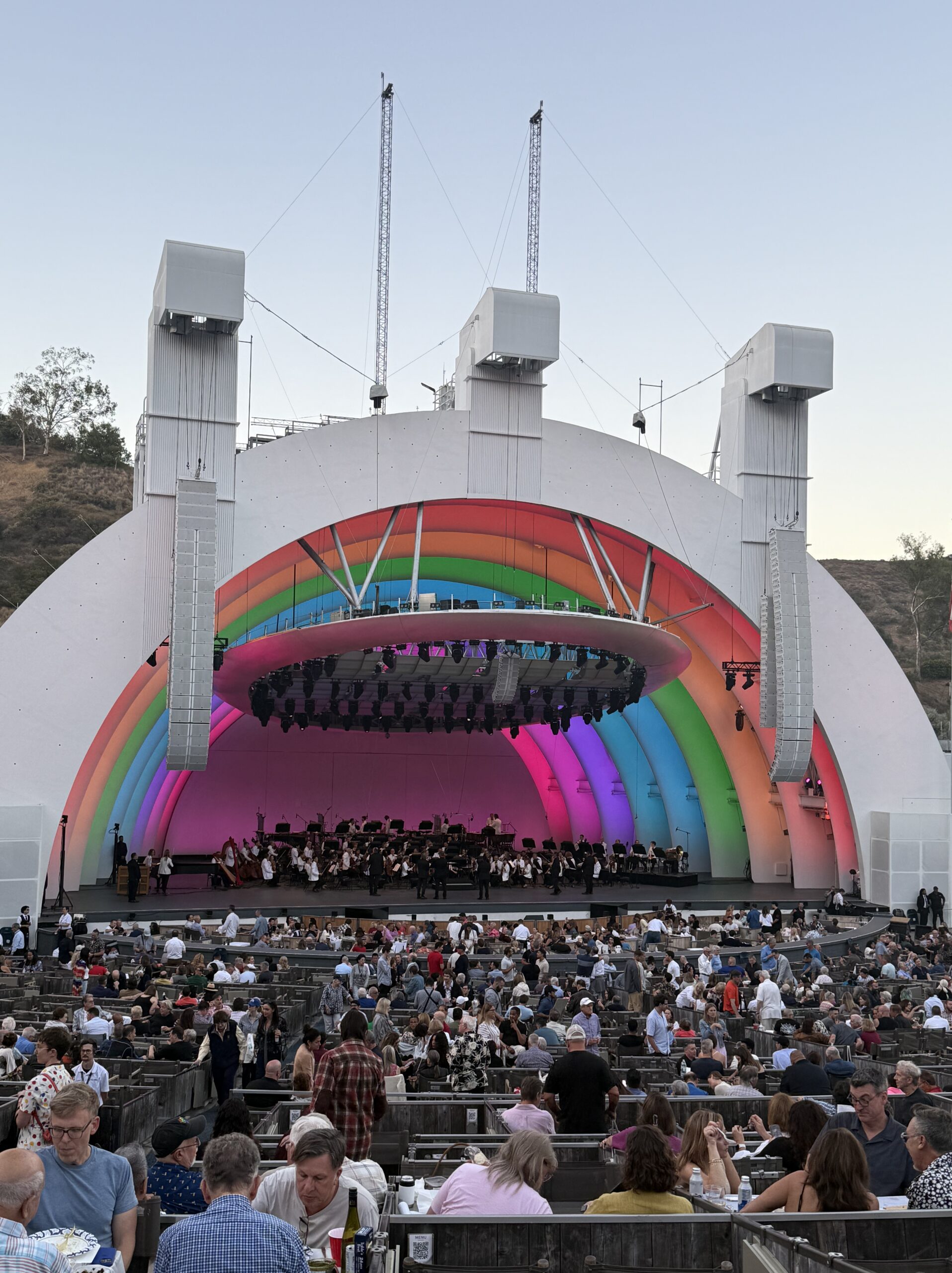
Written By
Regina Luz Jordan
Founder & Editor In Chief
If you still think classical music is stiff, straight or stuck in the past, you clearly weren’t at the Hollywood Bowl last Thursday. Classical Pride rolled in like a thunderclap of queerness, history and jaw-dropping talent. This was a cultural shift, not just another classical summer concert.
A celebration of LGBTQIA+ composers and performers who’ve shaped music for centuries but rarely get their flowers on stages this big. With world premieres, drag violins and one of the most spellbinding countertenor solos I’ve ever heard in my life, the night honored the past. And this show demanded a future where queer stories and classical music share the spotlight for good.
Classical Music Is Pop Culture
& Always Has Been
This moment is exactly why Hollywoodland News covers classical music. Not because it’s trendy or algorithm-friendly, but because it’s pop culture and always has been. The composers we now call “classical” were the controversial, beloved, copied, critiqued pop stars of their day. The opera houses were the drama filled arenas before TikTok existed. If you watched the first season of Bridgerton, you know what I mean.

So many of those composers were queer and not just whispered-about queer or maybe-suspected queer. They were loud, messy, complicated, beautiful queer as documented by letters and documented interactions at the time. Their music has always carried that complexity, that tension, that fire. This is why Classical Pride matters.

We don’t draw hard lines between culture and history here, because those lines are fake. Classical music lives in drag.
It lives in queer art. It lives in TikTok mashups and Hitchcock and Barbie scores and viral cello solos.
And when a night like this happens, when the LA Phil throws its weight behind a show called Classical Pride, that puts queerness front and center, with no apologies and no footnotes, it deserves coverage that’s just as unapologetic.
Hollywoodland News shows up for these moments because no one else does it the way we do, with context, a little bite and a deep love for the music and for the people who’ve always been told they don’t belong in the concert hall. Spoiler alert: they do. We do.
Opening with Fire:
Bernstein’s Candide Overture
A night of Classical Pride opened with Leonard Bernstein’s Overture to Candide, fast, fearless and full of mischief. It’s one of those pieces that doesn’t ease you in, it kicks the doors open.
Originally part of Bernstein’s troubled-but-beloved operetta Candide, the overture has long outlived the show’s Broadway run, becoming a concert staple all its own.


Like many composers featured, Bernstein lived a complex queer life under the weight of societal expectation. Though he married actress Felicia Montealegre in 1951, she knew about his relationships with men and they had an unspoken agreement that let him live between the lines.
After her death in 1978, Bernstein lived more openly with his male partner. His struggles with identity and the pressure to mask it were deeply woven into his later works. It was another reminder that queerness has always shaped the heart of classical music, whether or not the world was ready to name it.
Under Oliver Zeffman’s baton, Classical Pride’s use of Candide felt like a cheeky, high-energy prelude to what was coming and a signal that this wasn’t going to be some stuffy night at the Hollywood Bowl. It was bright, sharp and bursting with joy, a perfect opening shot for an evening rooted in queer brilliance and musical rebellion.
Soprano, Countertenor and Mezzo Brought classical pride
The Classical Pride and world premiere of Good Morning, Beauty, written by Jake Heggie and Taylor Mac, opened with soprano Pumeza Matshikiza, whose presence alone felt like a statement.
A Black South African woman, standing center stage at the Hollywood Bowl and breathing life into a piece about queer love is representation that hits deep. Her voice was lush and radiant, soaring and intimate all at once. She embodied the music and lyrics. Every note was laced with pride, precision, and presence.


Then came the highlight of the night for me, countertenor Anthony Roth Costanzo.
The mood shifted in a full-body, goosebump kind of way. He opened his mouth and the Hollywood Bowl transformed.
Costanzo’s voice is a force: otherworldly, grounded, intimate, and sharp enough to slice through the July haze like a silver blade. It is so rare to see a countertenor solo and for those who aren’t following, a countertenor is the equivalent of a male soprano. That voice is a beautiful gift.
Costanzo, who has performed everywhere from the Met to the Berlin Philharmonic, isn’t just one of the most celebrated voices in opera.
He’s also one of the most proudly visible gay men in classical music.

And yet, here he was on this queer-focused stage, using that same voice that’s sung for Pavarotti and the Met, to deliver a song cycle about long-term queer love. That’s not just representation. As a writer witnessing this through the lens of the LGBTQIA+ community, it’s an evolution. And that’s healing and power.
Good Morning, Beauty is a gift to queers in long-term relationships, romantic, sharp, messy and real. Costanzo’s solo was tender but unflinching. It felt like a prayer whispered through a megaphone. You could hear the history of every closeted composer and every silenced artist in his phrasing.
Then came Jamie Barton, and friends, she did not come to play. Barton’s voice doesn’t ask for permission. It walks in, takes a seat at the table and owns the room. There’s a reason why she’s one of the most celebrated mezzo sopranos in the world.

Her performance was rich, emotional and fully grounded in the kind of confidence you only earn through showing up for your community. Barton is one of the fiercest vocalists alive, and her queerness isn’t a sidenote. It’s part of the story, part of the sound and profoundly part of the message.
When the three of them joined together for the final ensemble piece, the effect was stunning. Three entirely different voices blending in a way that felt like a spell being cast. Each had already carved their own path in the program, but together, it felt like queerness, with all its layers and contradictions, singing itself into the night sky.
Author, Regina Luz Jordan’s Side Note: I was so damn excited to see this lineup, I reached out to soprano and recent Masters in Music graduate, Allegra Kelly who is going to be profiled on HLN, to tell her all about it and we fan girl-ed for like an hour about this because opera is AWESOME!
The Drag Violinist Who Lit Up classical pride
After all that emotional resonance, Thorgy Thor hit the stage like a glitter bomb of joy and balance was restored. There she was with violin in hand, wig tall and energy unmatched.
If anyone in the audience thought classical music had to be solemn or restrained, Thorgy came to lovingly snatch that notion out of their hands and toss it off the Hollywood Bowl’s hillside.

Thorgy first became known to most audiences through RuPaul’s Drag Race, where she stood out for her wit, eccentric glam, and, yes, her violin. Since then, she’s built an entire touring show around that intersection of high art and high camp, Thorgy and the Thorchestra, performing with major symphonies across North America. And if that sounds like a joke, it’s not. Her musicianship and her drag are dead serious.

Watching Thorgy perform is like watching three art forms at once, comedy, drag and classical training, all colliding in the best possible way. She’s not just a drag queen who plays violin. She’s a classically trained musician with degrees in both violin and viola who just happens to be hilarious and magnetic. The moment she started to play, you felt the whole amphitheater light up.
Her set blended orchestral finesse with raw queer performance. Thorgy doesn’t dilute anything, not the music, not the drag and not the humor. The crowd couldn’t get enough of that blend of art and identity, and honestly, neither could I. She embodied what this whole night was about, dismantling old ideas of what classical performance is supposed to look like, and replacing them with something loud, honest and joyful as hell.
Tchaikovsky’s Grand Finale: Pain, Passion and Queer Legacy

The night closed with Francesca da Rimini by Tchaikovsky, a piece so emotionally rich it practically bleeds across the stage. Conducted by Oliver Zeffman, the work delivered one final, heart-pounding sweep of drama. And let’s be real, if there’s any composer who understood yearning, repression, and the ache of forbidden love, it’s Tchaikovsky.
This wasn’t some dry historical nod. This was a deliberate reclamation. Zeffman brought Tchaikovsky into the conversation with intention, as a deliberate reclamation and reminded us that some of the most celebrated music in history was written by a man who couldn’t live freely in his own time. A man whose queerness was obscured, ignored or rewritten to fit someone else’s narrative.
Under Zeffman’s baton, the piece swelled with urgency. The strings felt sharp and haunted. The winds pulsed with dread. It told the story of doomed lovers, yes, but it also told a deeper one about queer longing. About what happens when passion has nowhere safe to go.

In the context of Classical Pride, it didn’t feel like just another orchestral finale. It felt like a haunting echo from the past, finally being heard the way it was always meant to be.
Why Classical Pride Mattered

Classical Pride wasn’t just a concert. This was a reclamation, a calling-in and a reminder that queer brilliance has always been part of the symphony, even if it was hidden in footnotes or left out of the program notes entirely. From Pumeza’s first soaring note to Thorgy’s electric chaos to the aching weight of Tchaikovsky’s finale, this night honored legacy while pushing the genre forward.
So yes, it stung to see so many empty seats. A show like this should’ve been standing room only, not just for the music, but for the message. For the kids who need to see themselves on stage. For the adults who never got to. This was music as protest, as celebration, as healing. These are the kinds of performances that change people, and they deserve full audiences, loud applause and the coverage to match.
This is what representation looks like when it’s done right. It wasn’t surface-level. It wasn’t rainbow-washed. It was thoughtful, funny, honest, raw and layered: just like queerness and just like music. These are the stories that we live to tell at Hollywoodland News and are always humbled and grateful for the opportunity to experience it.
For a list of upcoming shows at the Hollywood Bowl, check out their calendar here and for additional coverage of classical music concerts, search our music archive.


Leave a Reply